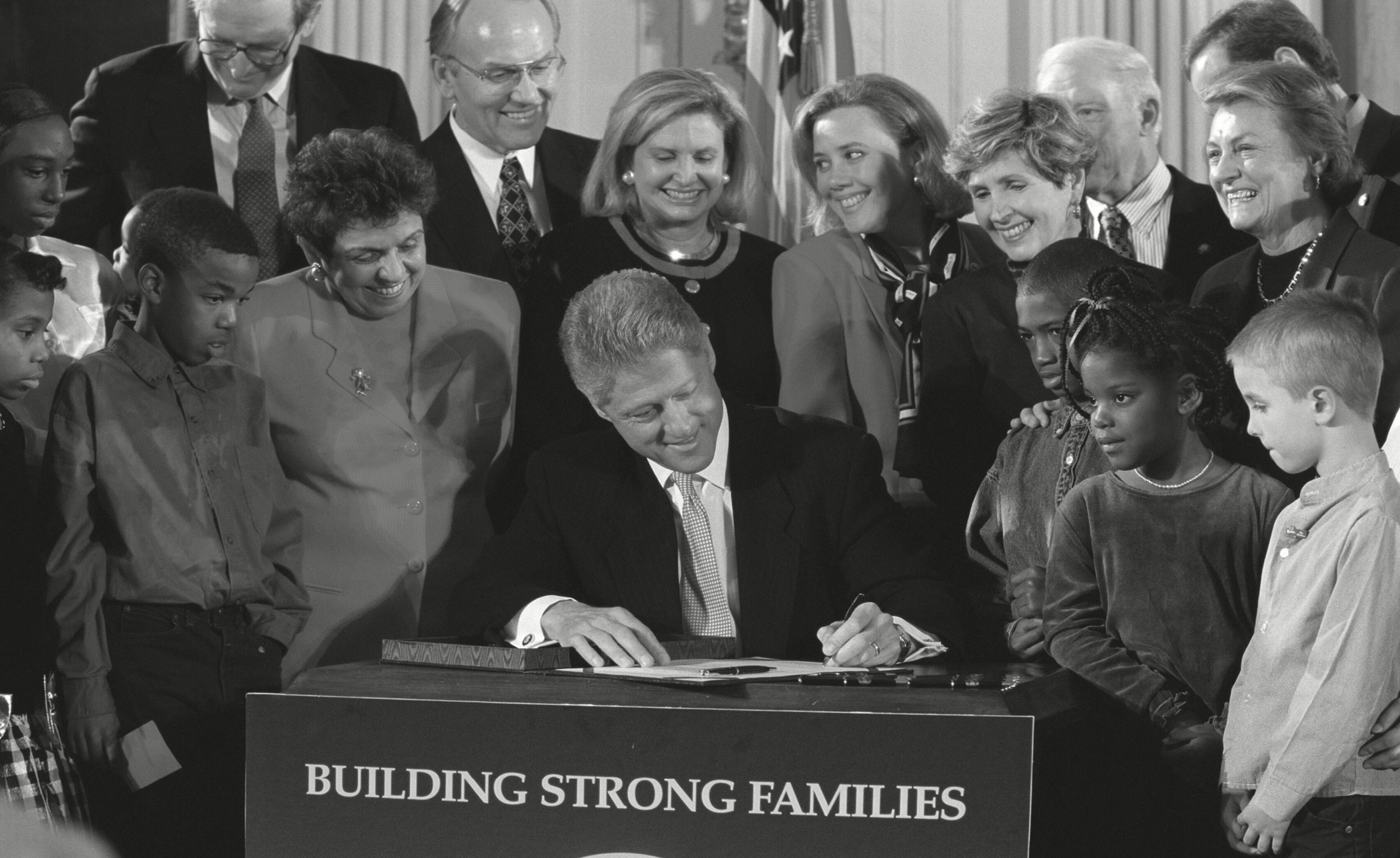Empowering Adoptive Parents to Successfully Navigate the Pathways of Parenting
Adoption Advocate No. 120
Adoption professionals have certain goals in mind when working with prospective adoptive families. The first goal for all involved is preparing for placement of the child(ren). This can be a joyous, complex, and somewhat overwhelming process—all at the same time. We know that part of the preparation process involves completion of the home study, in terms of both educating and evaluating a family’s capacity to parent a child through adoption. This process comes with checklists of things to do, paperwork to complete, meetings to schedule, and parenting classes to complete. It is the caseworker’s intention that these pre-placement educational trainings will help prepare our families not only for the process of adopting but for the adventure of parenting as well. In particular, we trust that our good pre-adoption education will one day be a useful tool that will prepare families for those days when they become frustrated and overwhelmed with parenting.
Like all forms of parenting we know that within the process of preparing a family to adopt, it is almost impossible to know what specific challenges may arise after the placement of a child. The goal, of course, is to equip the family for what they may find difficult after placement and may be unique to parenting a child in an adoption. During their training, adoption professionals know that they have planted seeds, but the expectation that they will all take root may be too high an expectation for every issue that could arise.
It would be perfect if we could fill a toolbox that we present to families upon placement from which they can pull out the perfect tool or technique at just the right time that specifically addresses their need. If this were possible, the tool kit would be filled with everything they’ll need to parent a child in every possible situation. But, we know the issues are too vast and too child-specific to predict every possible situation our families may face once they are parenting. One solution to this dilemma is a paradigm shift from simply seeing the provision of “parenting tools” as the main goal to a more practical goal of helping parents see themselves as significant influencers and vessels with the skills and ability to locate resources that help them further meet the unique needs of their child.
Becoming an Influencer
This is an exploration of how we, as adoption professionals, help our adoptive parents become influencers. How do we prepare them, and what are the relevant truths we want to pass on to them? We can do this by giving parents a three-pronged approach that includes the opportunity to 1) know themselves, 2) prepare themselves, and 3) fill themselves with what they need to be empowered and successful on their parenting journey.
From time to time we all need the reminder that we are not capable of changing another person’s behavior. We can influence but only that person can make change. This includes our abilities to influence our own children. Parents often feel they are responsible to change behaviors being demonstrated by their child, yet they find timeouts, grounding, and withholding privileges often do not have the desired impact. Maybe the better way to bring about desired change is to influence our children in order that they create their own change. With this concept in mind, we seek to answer the question: How do we as adoption professionals help our adoptive parents become the best possible influencers for their children?
Knowing Yourself
Adoptive parents need to know themselves. There needs to be an understanding of how their own childhood may impact their parenting style and decisions. It is also important for new parents to understand their individual journey to become parents and how this may also impact their parenting. Developing an understanding of these two important issues will contribute to the goal of being a successful influencer.
We are all familiar with the nature vs. nurture conversation. I would like to focus on the nurture part of that conversation as it relates to modeling. Our parents modeled parenting for us. Some of us had very positive experiences and some of us did not. It is important to the professional to have an awareness of what our adoptive parents may be bringing into their own parenting perspectives. There are tools available that can help agencies and parents explore this. The Adverse Childhood Experiences (ACE) questionnaire is a brief questionnaire that can provide a great deal of insight. Not only does it allow adoptive parents to see how they may have been impacted as a child, but it also allows them to see how their own experiences may impact those in their care. Their childhood may be an influential lens through which they see their role and responsibilities as a parent. Either their own upbringing can be used to connect with a child or it may become a trigger for unhealthy interaction.
Using the ACE questionnaire will require the adoption professional to understand the implications of the score and how it may open wounds for some people. Each of us has a responsibility to support those who may need help working through painful memories from childhood. This may seem like extra work on the part of the agency, but the long-term impact on the individual and their children will prove fruitful. We know that the children entering these adoptive families need the power of the relationship to heal. They need someone to value, love, and believe in them. It will take a healthy parent to meet this important need.
Some adoption journeys are born out of grief. Miscarriage, infertility, and death of a child are all possibilities. Although there is a diversity of reasons that families consider adoption today, many turn to adoption when all else has failed. When this is the case, we know that there is the possibility that subsequent parenting may be impacted. Sometimes parents have unrealistic expectations of their child. Others may find themselves being overly permissive in their parenting. There are many other implications, but these are two commonly seen parenting perspectives. Providing a safe space for prospective adoptive families to explore these issues allows for a stronger and healthier foundation on which to build their parenting model.
Preparing Yourself
We have looked at some of the things that may have molded our adoptive parents, including their childhood experiences and their journey to parenting. The next part of helping them become successful influencers is helping them feel prepared as an individual. Not with more knowledge and understanding, but by preparing themselves individually. This is something that they work on every day.
Preparing Instead of Reacting
Parents are people too and require certain things in their day-to-day lives that allow them to be a whole and healthy person. Often this truth of self-care is forgotten or neglected. The idea that, as a “good” parent, “my needs must come last” is not a healthy long-term strategy. When that way of thinking is employed, the sustained ability to parent has diminishing returns. Basic, everyday self-care needs to be in place along with other things that feed the soul. This means something different to each person. Providing adoptive parents an opportunity to think about this and plan for it will make a big difference in the success of their parenting. When parents struggle, often the first thing they let go of—the importance of self-care—is just what they need to continue. Our goal is to help them see that what they need to be whole and healthy is critical to long-term parenting success. Keeping these habits in place gives them a strong platform from which they will tackle the challenges of parenting. Remember that they are the model for their child. It is through demonstrating this behavior that they are influencing their children. Therefore, these practices are not just good from them; they are also good for their child.
Filling Yourself
Feeling filled with the tools necessary to successfully parent is the natural result of the things we have already explored. Helping a prospective adoptive parent understand who they will be as a parent because of their past helps them avoid triggers and other parenting missteps but also allows them to see how they can better connect and relate with their child. It provides a clarity in their parenting that can be very powerful.
Being prepared—not just as a parent but as a person—provides many of the things needed to feel successful. Feeling whole and healthy as an individual leads to a calm mind and spirit, patience, understanding, and the ability to meet the needs of others. This is a recipe for empowered parenting.
We can help our families feel whole and healthy by encouraging them to engage in the things that “feed” them. The first step is to determine what these things are. For some, it is exercise, or music, or reading, or time alone. For many of our families, it seems counterintuitive to think of themselves and consider their needs, but we know how important this is for their success. As adoption professionals, we can create the time and space within the home study process for our families to decide what elements they need in their lives to feel filled. The next step is to have them begin practicing those things in their daily lives. Doing this before a child is placed in their home will allow for greater success. We are much less likely to implement something new or different in the midst of a busy or stressful time.
Final Thoughts and Recommendations
It is one thing to think about these concepts but putting them into practice is what will prove to be the challenge. Virtually every adoption professional has received a call from an adoptive parent in crisis with their child. Our first response is to help them sort out the behaviors and find a solution. Of course, this is often necessary and appropriate. But what if part of our response was to remind our parents of who they are in all of this? They are the influencers and the covert agents of change. Helping them get back to what they know about themselves and reminding them of how they have prepared themselves will allow them to recognize that they are already empowered and equipped to deal with what may be a very challenging situation.
As we think about how we want to prepare and empower our adoptive parents, consider the following:
Provide an opportunity for prospective adoptive parents to know themselves.
Consider using a tool like the ACE questionnaire to take a look at childhood trauma in the lives of the adoptive parents. Exploring this ahead of time will allow for a more empowered parenting experience.
Explore what each prospective adoptive parent needs to be whole and healthy.
Their lives cannot become all about parenting. Giving parents permission to do what they need to do to be healthy will allow them to model healthy living to their children and will keep them filled with what they need to be prepared and not reactive in their parenting.
Encourage them to ask for help.
Many adoptive parents are reluctant to ask for help. They often feel that they wanted and pursued this family so asking for help is somehow not okay. We need to let them know that it is more than ok, it is necessary. Adoptive parents need help and support as much as their children. So, when they call and ask for help, give them what they need first.
Conclusion
As adoption professionals, we have a great deal to accomplish when working with families wanting to adopt. The last thing we want is to add more to your plate. The hope and goal is to provide a few things to add to the process that will yield greater results. If we can help our adoptive parents come to know themselves a little better, understanding and reconciling their motives for adopting, and ways that they can prepare themselves for the realities of parenting, we will find that we have given our adoptive families the tools they need to feel empowered as parents.




